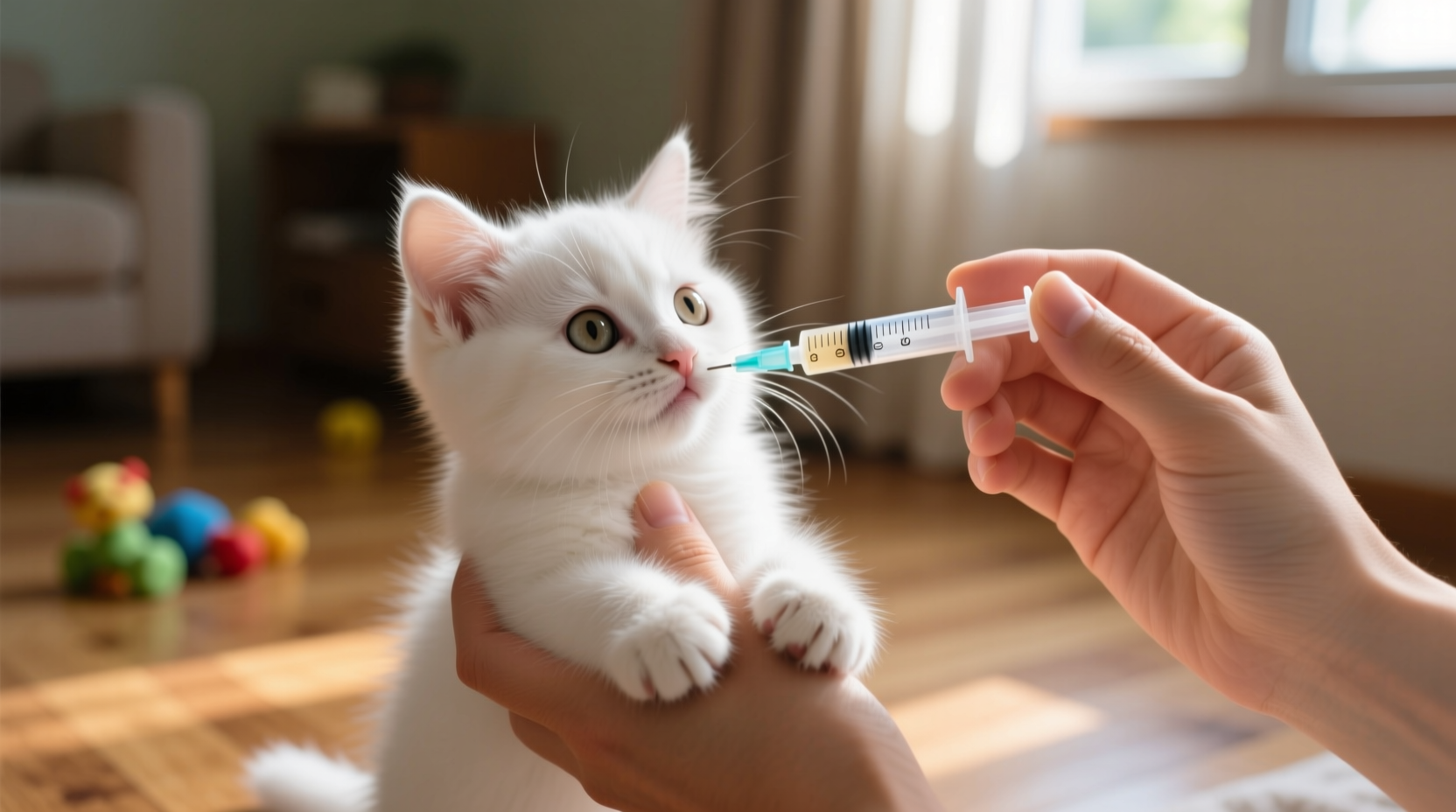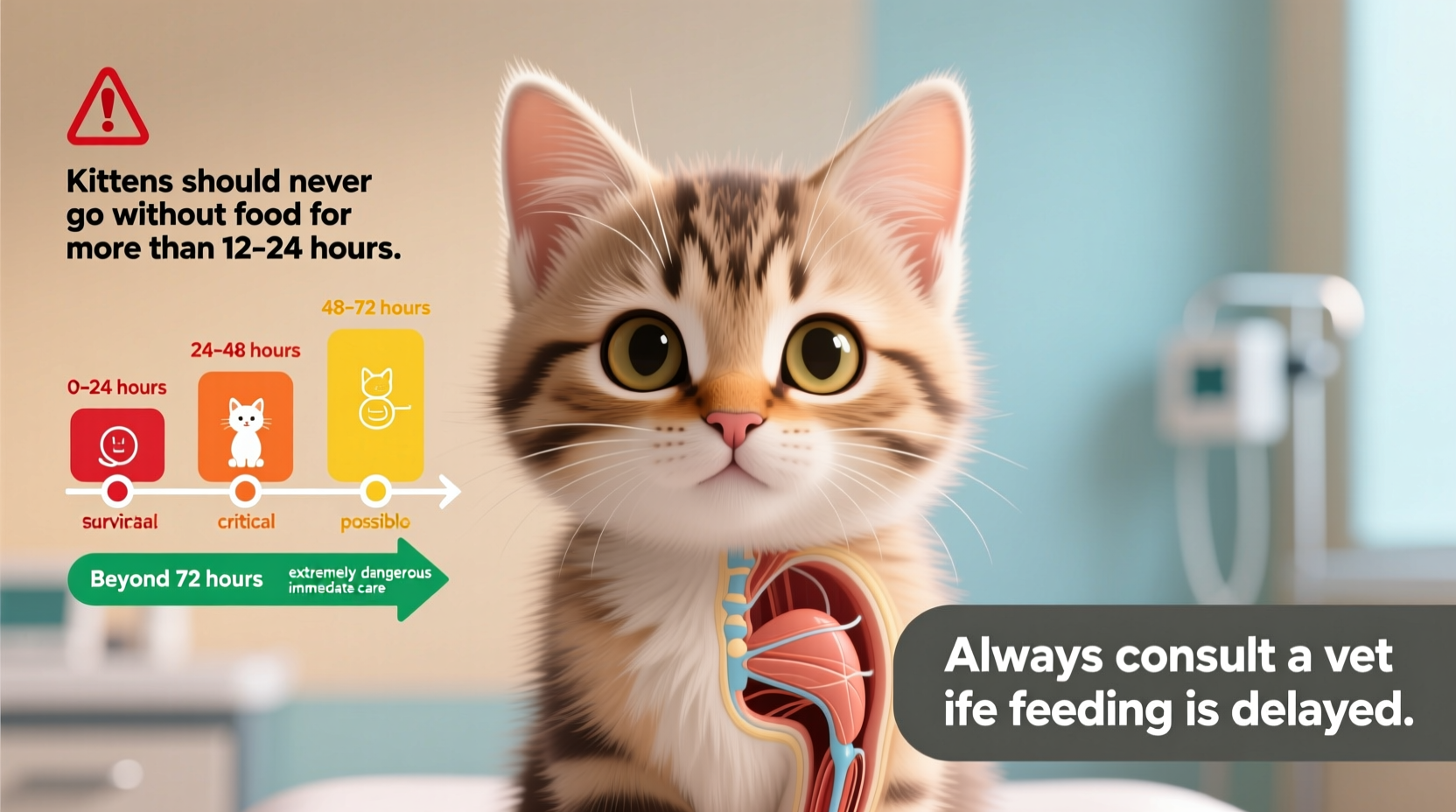Immediate Answer: Kittens should never go more than 12 hours without food. Newborn kittens can develop life-threatening hypoglycemia within 4-6 hours, while kittens 4 weeks and older risk hepatic lipidosis after 24-48 hours without proper nutrition. Immediate veterinary attention is required if your kitten hasn't eaten for 12 hours.
Discovering your kitten isn't eating can trigger immediate panic. Unlike adult cats, kittens have minimal energy reserves and immature metabolic systems that make them exceptionally vulnerable to food deprivation. This comprehensive guide provides time-sensitive information you need to protect your vulnerable feline companion, with clear action steps based on your kitten's age and condition.
Why Kittens Can't Go Without Food Like Adult Cats
Kittens' tiny bodies operate on a metabolic knife-edge. Their liver function isn't fully developed, they have almost no fat reserves, and their blood sugar regulation is fragile. When food intake stops, kittens rapidly deplete their limited glycogen stores—often within hours. This triggers a dangerous cascade where the body starts breaking down fat for energy, overwhelming the immature liver and potentially causing hepatic lipidosis (fatty liver disease), which can be fatal within days.
| Kitten Age | Maximum Safe Time Without Food | Immediate Risk Level | Critical Warning Signs |
|---|---|---|---|
| Newborn-1 week | 2-4 hours | Extreme | Hypothermia, lethargy, weak cry |
| 1-2 weeks | 4-6 hours | Very High | Dehydration, unresponsiveness |
| 2-4 weeks | 6-8 hours | High | Stumbling, refusal to nurse |
| 4-8 weeks | 10-12 hours | Moderate-High | Vomiting, diarrhea, hiding |
| 8+ weeks | 12-24 hours | Moderate | Jaundice, drooling, collapse |
The Critical 24-Hour Timeline: What Happens Inside Your Kitten's Body
Understanding the physiological timeline helps you recognize when every minute counts. This medically-verified progression shows why immediate action is crucial:
- 0-4 Hours: Blood glucose drops rapidly, especially dangerous for newborns. Hypoglycemia causes weakness, shivering, and mental confusion.
- 4-12 Hours: The body shifts to fat metabolism. Without sufficient protein intake, the liver becomes overwhelmed processing fat, beginning the path to hepatic lipidosis.
- 12-24 Hours: Dehydration sets in rapidly. Electrolyte imbalances affect heart and nerve function. The risk of bacterial translocation from the gut increases.
- 24-48 Hours: Hepatic lipidosis develops in 90% of kittens who haven't eaten. Liver enzymes skyrocket, causing jaundice and potentially irreversible damage.
- 48+ Hours: Multi-organ failure becomes likely. Mortality rates exceed 70% without aggressive veterinary intervention.
This timeline comes from the Cornell Feline Health Center's clinical observations of kitten metabolic disorders. Unlike adult cats whose livers can handle short fasting periods, kittens' immature hepatic systems make them exceptionally vulnerable.
Recognizing Emergency Warning Signs That Require Immediate Action
Don't wait for the clock to run out. These symptoms indicate your kitten needs veterinary care within the hour:
- Body temperature below 99°F (check with pediatric thermometer)
- Extreme lethargy—doesn't respond to touch or sounds
- Yellowing of gums or eye whites (jaundice)
- Unsteady gait or inability to stand
- Dry gums that don't bounce back when pressed (indicating severe dehydration)
According to the American Association of Feline Practitioners' 2023 Kitten Care Guidelines, kittens showing even one of these symptoms have crossed into medical emergency territory requiring immediate intervention.
Action Plan: What to Do When Your Kitten Stops Eating
Step 1: Immediate Assessment (First 1-2 Hours)
Before panicking, quickly determine if this is a true emergency:
- Check for obvious physical issues: mouth injuries, nasal congestion blocking breathing while eating
- Verify food hasn't spoiled or changed recently
- Confirm the kitten isn't just being finicky (older kittens may skip a meal)
- Test responsiveness: does the kitten react to petting or sounds?
Step 2: Emergency Feeding Protocol (If No Eating for 4+ Hours)
For kittens under 4 weeks who haven't eaten in 4 hours, or older kittens beyond 8 hours:
- Warm them first: Hypothermic kittens can't digest food. Wrap in a towel warmed on low setting for 5 minutes.
- Hydrate before feeding: Use a syringe to give 1-2 ml of kitten milk replacer or unflavored Pedialyte every 30 minutes for 2 hours.
- Small, frequent meals: Feed 1-3 ml of warmed formula every 2 hours (adjust for age/size).
- Never force-feed: This can cause aspiration pneumonia. If resistant, seek vet help immediately.

Step 3: When to Rush to the Emergency Vet
Don't wait—head to the vet immediately if:
- Your kitten is under 2 weeks old and hasn't eaten in 4 hours
- There's any sign of blood in vomit or stool
- The kitten has gone beyond 12 hours without food (any age)
- You notice labored breathing or collapse
- Previous attempts at feeding were unsuccessful
The American Veterinary Medical Association emphasizes that delaying treatment for anorexic kittens dramatically reduces survival rates. What seems like a minor issue can become critical within hours.
Preventing Future Food Refusal: Essential Kitten Feeding Practices
Establish these habits to avoid emergencies:
- Strict feeding schedule: Kittens under 8 weeks need 4-6 meals daily; don't let them go more than 6-8 hours between meals
- Temperature matters: Serve food at 100-102°F (body temperature) for optimal acceptance
- Monitor intake: Weigh your kitten daily; sudden weight loss of 10% is an emergency
- Transition slowly: When changing foods, mix old and new over 7-10 days
- Stress reduction: Feed in quiet, secure spaces away from household traffic
Special Considerations: When Standard Guidelines Don't Apply
These situations require modified approaches:
- Post-surgery kittens: May need specialized liquid diets; follow vet's specific instructions
- Orphaned kittens: Have no maternal antibodies; require strict feeding schedules every 2-4 hours
- Kittens with URI: Nasal congestion blocks smell—try warming food to enhance aroma
- After vaccinations: Temporary appetite loss is common but shouldn't exceed 12 hours
Remember that environmental factors significantly impact feeding behavior. The Cornell Feline Health Center notes that kittens in multi-cat households may experience food competition stress, while shelter kittens often develop neophobia (fear of new foods) that mimics appetite loss.
Long-Term Consequences of Inadequate Kitten Nutrition
Surviving an episode of food deprivation doesn't mean your kitten is out of danger. Research published in the Journal of Feline Medicine and Surgery shows that kittens who experience even brief periods of inadequate nutrition:
- Have 30% higher risk of developmental issues
- May develop permanent feeding aversions
- Often show compromised immune function for months
- Can experience stunted growth affecting skeletal development
This underscores why preventing food deprivation is far better than treating it—your kitten's entire developmental trajectory depends on consistent, adequate nutrition during these critical early months.











 浙公网安备
33010002000092号
浙公网安备
33010002000092号 浙B2-20120091-4
浙B2-20120091-4